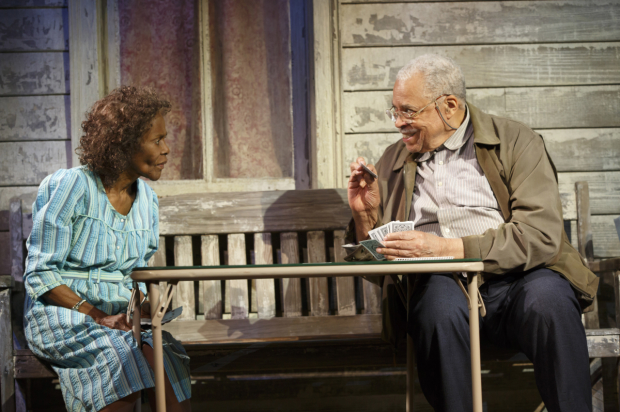The Gin Game
D.L. Coburn’s 1976 play about a card game proves to be surprisingly prescient in this Broadway revival starring James Earl Jones and Cicely Tyson.

(© Joan Marcus)
Card games do not make very exciting spectator sports: Unless you're really desperate, you'll probably flip past poker on ESPN without a second thought. Yet the Broadway revival of D.L. Coburn's The Gin Game at the John Golden Theatre is positively thrilling. Starring Tony Award winner Cicely Tyson (The Trip to Bountiful) and two-time Tony winner James Earl Jones (You Can't Take It With You), this two-hander set in a retirement home proves to be more gripping than the X Games.
The Gin Game first played Broadway in 1977 with husband-and-wife team Hume Cronyn and Jessica Tandy, who set a high bar for all subsequent casts with their authentic chemistry and comic timing. This marks the play's second Broadway revival (Julie Harris and Charles Durning did it in 1997) and the first major production with an all-black cast. Undeniably, the play has grown more powerful and resonant over time, especially as the setting has dilapidated under Riccardo Hernandez's unrelenting scenic vision.
The back porch on which the action takes place is cluttered with old walkers, rusty chairs, and discarded canes. An ancient refrigerator sits upstage like a sarcophagus. This is where old things go to be out of sight and out of mind, including resident Weller Martin (Jones). He shuffles cards for what appears to be a game of solitaire until a distraught Fonsia Dorsey (Tyson) enters the space. She's new to the home and has few friends. After some introductory words, Weller offers to distract her with a round of gin (the game, not the beverage). What starts as a friendly match takes on a deeper significance as Weller begins to view the game as a signifier of his waning virility. It's hard to feel like a big man when you keep getting bested by a tiny old woman.
This may seem like a ridiculous premise, but anyone who has ever engaged in a tense game of Monopoly will immediately understand how such competitive diversions can become a hair-raising death match. Still, it's a lot to expect an audience to stay focused through two hours of watching old folks plays cards. Thankfully, the players are two master thespians with 124 years of combined experience. Their performances raise Coburn's script (with its light plot of two characters in a back-and-forth) to Beckettian levels, forcing us to mine for deeper meaning in the text while keeping us completely transfixed.
As is the case with many older actors, Jones and Tyson make bold choices and commit to them completely. While Cronyn's Weller was a hard old kernel of popcorn ready to combust, Jones' rendition is more akin to a deep and foreboding ocean: Its vast silence offers a false comfort until a squall comes through, destroying everything in its path (a realistic thunderstorm created by sound designer David Van Tieghem and lighting designers Jules Fisher and Peggy Eisenhauer seems to take its cues from Jones' tempestuous performance). Tyson is the creaky ship in the path of the hurricane: She shuffles around stage, frail yet surprisingly resilient in the face of Weller's cruelty. Although their two characters have ostensibly just met, they project a complicated relationship — like an old married couple whose years of proximity have taught them how to salt each other's wounds.
Critics have contended that The Gin Game is a gimmick that relies too much on such memorably starry performances. The latter may be true of this production — the acting really is magnificent — but Leonard Foglia's smart direction helps to draw out Coburn's underlying themes, proving this play to be much more than a mere card trick.
Hernandez (who also designed the costumes) augments Jones' deceptive performance by dressing him like the Werther's Original grandpa. His kindly exterior masks a malicious tongue and impulse to destroy. Hair designer Paul Huntley outfits Tyson with a cheap-looking wig that is far too young for someone of her advanced age, suggesting that wigmakers don't design their wares with seniors in mind. Our central characters quietly survive the indignities of their everyday existence, trying to retain some semblance of the agency they once had.
In many ways, this tale of the plight of the elderly feels more urgent today as the liberal social safety net of the 1970s has eroded and Americans live to unprecedented old age (Jones and Tyson are roughly two decades older than Cronyn and Tandy were when they played these roles). Weller laments, "I guess we just lived too long, Fonsia." Both characters are here on welfare and judging by the shabby state of the varnish on the house, that doesn't afford them a whole lot. "This is a Goddamn slum," he spits. Since the typical African-American family controls just one-thirteenth the wealth of the typical white family, it's safe to assume that black elders like Weller and Fonsia are in even more dire circumstances than their white counterparts.
The Gin Game is a not-to-be-missed theatrical event, not just for the opportunity to witness two living legends at work, but to see them put their craft toward a story that really matters in 2015 America.









